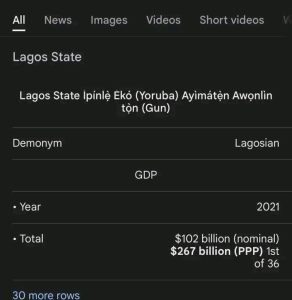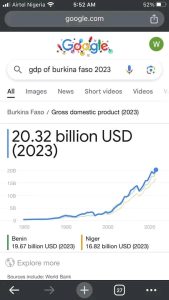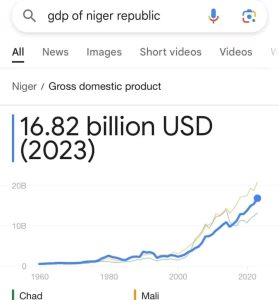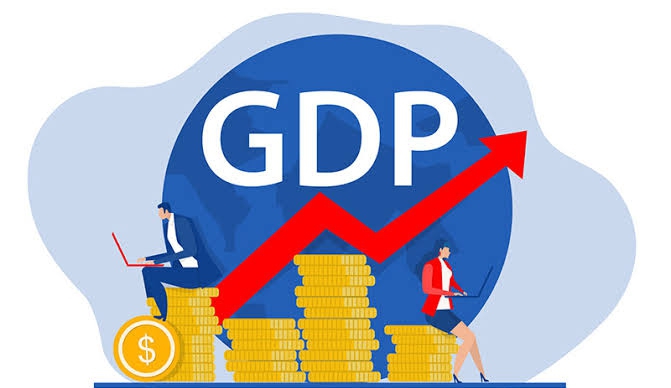GDP: LAGOS STATE’S ECONOMIC DOMINANCE: A COMPARATIVE ANALYSIS WITH THREE WEST AFRICAN COUNTRIES
A striking revelation has emerged, showcasing the economic might of Lagos State, Nigeria. A recent comparison has highlighted that the combined Gross Domestic Product (GDP) of Burkina Faso, Mali, and Niger Republic totals approximately $57.96 billion. In stark contrast, Lagos State’s GDP stands at an impressive $102 billion, as of 2021.
This staggering disparity underscores Lagos State’s significant contribution to Nigeria’s national economy, solidifying its position as a vital driver of economic growth and development. The comparison also underscores the economic resilience and growth of Lagos State, which has emerged as a beacon of economic excellence in the West African region.
KEY HIGHLIGHTS OF THE COMPARISON
– Combined GDP of Burkina Faso, Mali, and Niger Republic: $57.96 billion
– Lagos State’s GDP (2021): $102 billion
– The GDP figures for Burkina Faso, Mali, and Niger Republic are based on 2023 data, while Lagos State’s GDP is from 2021, suggesting that the actual GDP of Lagos State may be even higher.
IMPLICATIONS OF THE COMPARISON
– Lagos State’s economic dominance underscores its strategic importance to Nigeria’s national economy.
– The comparison highlights the need for other West African countries to explore opportunities for economic growth and cooperation.
– The disparity in GDP between Lagos State and the three West African countries underscores the importance of targeted economic policies and investments in driving growth and development.
IN-DEPTH ANALYSIS
– Economic Diversification: Lagos State’s economy is diversified, with key sectors including finance, manufacturing, construction, and services. This diversification has enabled the state to maintain economic stability and drive growth.
– Infrastructure Development: Lagos State has invested heavily in infrastructure development, including transportation networks, energy, and telecommunications. This has created a conducive business environment, attracting investments and driving economic growth.
– Human Capital Development: Lagos State has prioritized human capital development, with investments in education, healthcare, and skills development. This has created a skilled and productive workforce, driving economic growth and development.
CONCLUSION
The comparison between Lagos State’s GDP and the combined economic output of Burkina Faso, Mali, and Niger Republic serves as a testament to the economic resilience and growth of Lagos State. As Nigeria’s economic hub, Lagos State continues to play a vital role in driving economic growth and development in the country. The state’s economic dominance underscores the importance of targeted economic policies, investments in infrastructure and human capital development, and economic diversification in driving growth and development.








